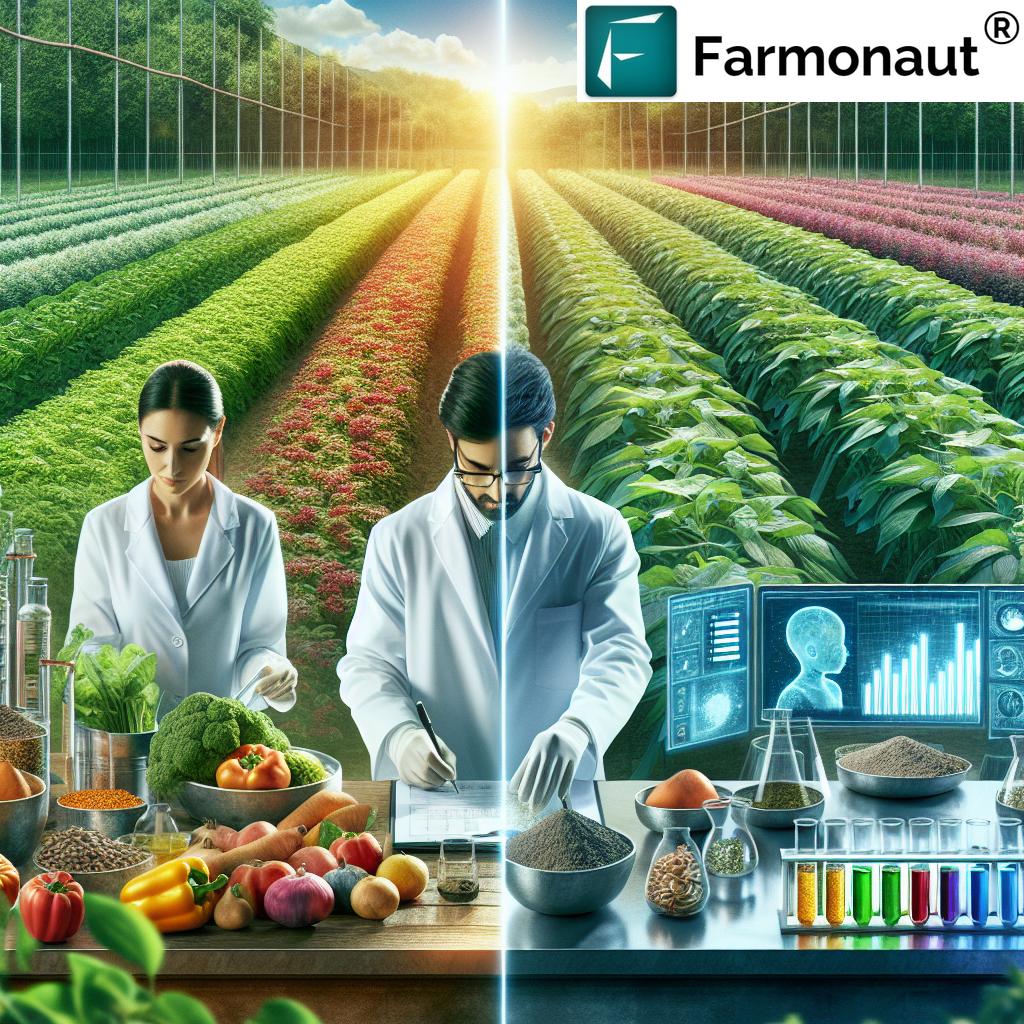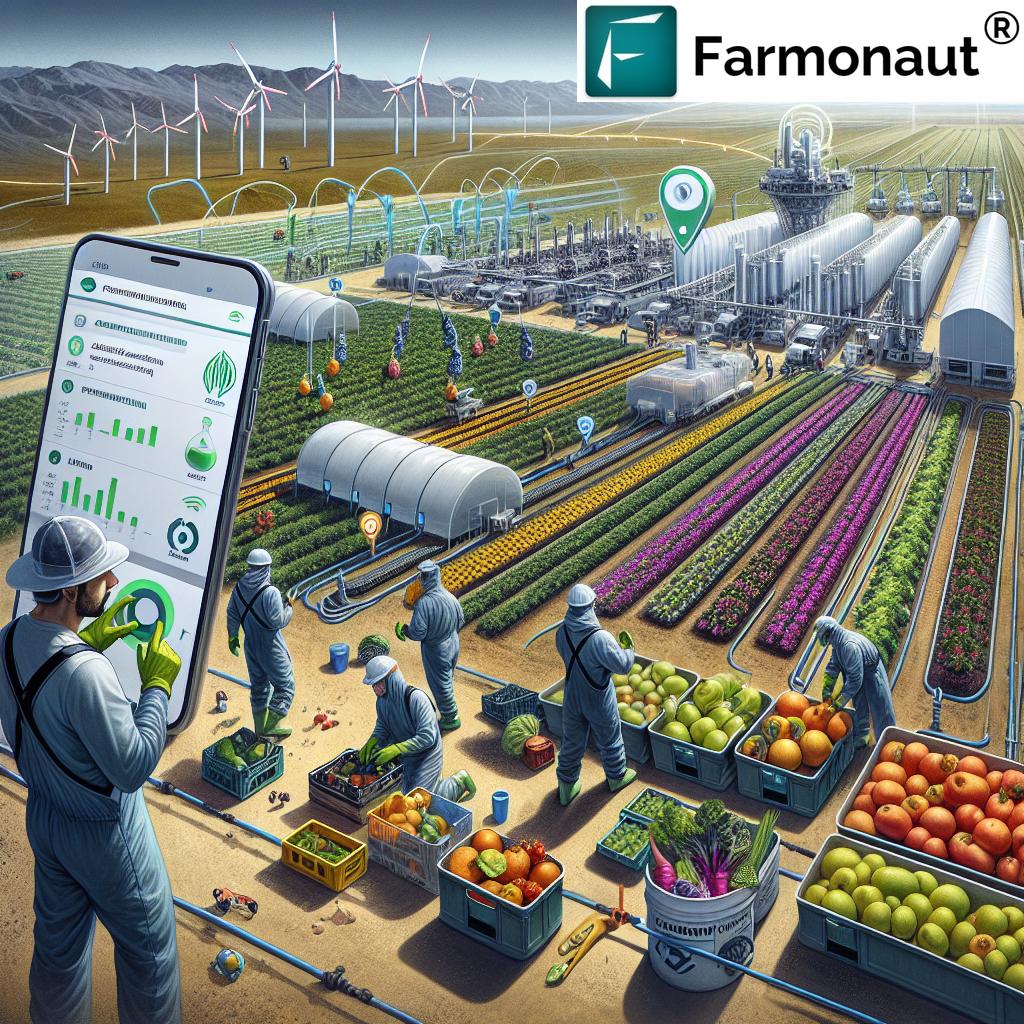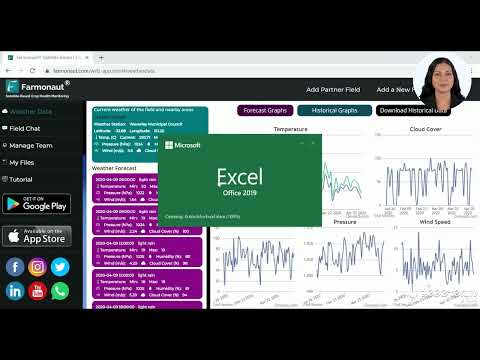California’s New Baby Food Safety Law: How Farmonaut’s Sustainable Farming Practices Combat Heavy Metal Contamination
“California’s new law requires disclosure of toxic metal testing in baby food via QR codes on packaging, covering 4 specific metals.”
As we step into a new era of food safety regulations, California’s groundbreaking law on baby food transparency has caught the attention of consumers, manufacturers, and agricultural experts alike. At Farmonaut, we understand the critical importance of this development and its potential to reshape the landscape of sustainable farming practices. In this comprehensive exploration, we’ll delve into the intricacies of the new law, its implications for the food industry, and how innovative agricultural technologies are paving the way for safer, cleaner produce from farm to table.
Understanding California’s New Baby Food Safety Law
The new California law, known as AB899, marks a significant milestone in food safety regulations, particularly focusing on heavy metals in baby food. This legislation emerged from alarming findings in a 2021 congressional investigation that revealed disturbingly high levels of toxic metals in processed baby foods. The investigation uncovered arsenic levels that were a staggering 91 times above allowable limits, highlighting the urgent need for stringent safety measures.
Under this new law, baby food manufacturers are required to provide unprecedented transparency regarding heavy metal contamination in their products. The key aspects of this legislation include:
- Mandatory QR codes on packaging linking to test results for four toxic heavy metals: lead, mercury, arsenic, and cadmium
- Disclosure of metal concentrations found in baby food products
- Implementation starting January for new packaging, with gradual availability in stores
This law aims to address a critical gap in safety standards, as the FDA has not yet established definitive allowable limits for heavy metals in baby food. However, the agency is working towards developing “action levels” to guide manufacturers and protect consumers.

The Impact on Consumer Protection and Industry Response
The implementation of this law represents a significant step forward in consumer protection, particularly for infants and young children who are most vulnerable to the effects of heavy metal exposure. Even at low levels, these contaminants can severely impair brain development, underscoring the critical nature of this initiative.
For consumers like Erin Yancovich, who have experienced the devastating effects of lead poisoning in children firsthand, this law offers hope for preventing future tragedies. However, the effectiveness of the law in empowering consumers to make informed choices remains to be seen, as interpreting the disclosed data may prove challenging for busy parents.
The industry’s response to these new requirements has been mixed. Some manufacturers, like Serenity Kids, have proactively enhanced their testing protocols and taken measures to improve ingredient safety. This showcases the industry’s potential to adapt and innovate in response to new regulations.
The Role of Sustainable Farming Practices in Combating Heavy Metal Contamination
At the heart of addressing heavy metal contamination in baby food lies the critical issue of soil contamination and sustainable farming practices. Heavy metals are not exclusive to processed foods; they occur naturally in soil and can be present in various fruits and vegetables. This underscores the need for comprehensive approaches to soil management and crop cultivation.
Sustainable farming practices play a pivotal role in mitigating heavy metal contamination:
- Crop rotation and diverse planting to reduce soil depletion
- Use of organic fertilizers and compost to improve soil health
- Implementing precision agriculture techniques for targeted resource management
- Adopting integrated pest management to reduce reliance on chemical pesticides
These practices not only help in reducing heavy metal uptake by plants but also contribute to overall soil health and environmental sustainability.
Farmonaut’s Contribution to Sustainable Agriculture
At Farmonaut, we recognize the crucial role that advanced agricultural technologies play in promoting food safety and sustainable farming practices. Our satellite-based farm management solutions offer valuable tools for farmers and agribusinesses to implement precision agriculture techniques effectively.
Key features of Farmonaut’s platform that contribute to safer, cleaner produce include:
- Real-time crop health monitoring using multispectral satellite imagery
- AI-based advisory systems for optimized resource management
- Blockchain-based traceability solutions for enhanced transparency in the food supply chain
- Carbon footprinting tools to help agribusinesses monitor and reduce their environmental impact
By leveraging these technologies, farmers can make informed decisions about irrigation, fertilizer usage, and pest management, ultimately leading to healthier crops and reduced reliance on potentially harmful chemical inputs.
The Importance of Food Ingredient Transparency
“Studies found alarming concentrations of heavy metals in processed baby foods, prompting new regulations to address soil contamination and farming practices.”
Food ingredient transparency is a cornerstone of consumer trust and safety. California’s new law exemplifies the growing demand for clear, accessible information about the food we consume, especially when it comes to our most vulnerable population – infants and young children.
The benefits of increased transparency include:
- Empowering consumers to make informed choices
- Encouraging manufacturers to improve their sourcing and production processes
- Fostering trust between consumers and food producers
- Driving innovation in food safety and quality control measures
While the new law focuses specifically on baby food, it sets a precedent for broader transparency initiatives across the food industry. This shift towards openness aligns with Farmonaut’s mission to promote sustainable and responsible agricultural practices.
Challenges in Implementing the New Regulations
Despite the clear benefits, the implementation of California’s new baby food safety law faces several challenges:
- Interpreting test results may be difficult for consumers without scientific backgrounds
- Potential loopholes in the law regarding accountability of importers and distributors
- The need for standardized testing methods and reporting formats across the industry
- Balancing transparency with the protection of proprietary information
Addressing these challenges will require ongoing collaboration between regulators, manufacturers, and consumer advocacy groups. It also highlights the need for continued education and support for consumers in understanding and utilizing the disclosed information effectively.

The Role of Technology in Ensuring Food Safety
Advanced technologies play a crucial role in monitoring and ensuring food safety throughout the supply chain. At Farmonaut, we leverage cutting-edge tools to support sustainable farming practices and enhance food safety:
- Satellite-Based Crop Health Monitoring: Our platform uses multispectral satellite images to provide real-time insights into crop health, helping farmers identify and address potential issues before they impact produce quality.
- AI-Driven Advisory Systems: The Jeevn AI system delivers personalized farm management advice, optimizing resource use and reducing the need for potentially harmful chemical inputs.
- Blockchain-Based Traceability: Our traceability solutions ensure transparency at every stage of the food supply chain, from farm to consumer.
These technologies not only support sustainable farming practices but also contribute to the production of safer, cleaner produce. By providing farmers with precise data and actionable insights, we help minimize the risk of contamination and optimize crop health.
The Future of Food Safety and Sustainable Agriculture
As we look to the future, it’s clear that the intersection of food safety, sustainable agriculture, and advanced technology will continue to shape the industry. Some key trends and developments to watch include:
- Increased adoption of precision agriculture techniques to optimize resource use and minimize contamination risks
- Growing consumer demand for organic and pesticide-free produce, particularly in baby food production
- Advancements in soil remediation technologies to address existing contamination issues
- Development of more sensitive and accurate testing methods for detecting heavy metals and other contaminants
- Integration of AI and machine learning in predictive food safety models
At Farmonaut, we’re committed to staying at the forefront of these developments, continuously enhancing our platform to support farmers and agribusinesses in meeting evolving food safety standards.
Comparative Analysis: Heavy Metal Levels in Baby Food
| Heavy Metal | California’s New Limit (ppb) | Estimated Current Average (ppb) | Potential Reduction (%) |
|---|---|---|---|
| Lead | 5 | 20 | 75% |
| Mercury | 2 | 7 | 71.4% |
| Arsenic | 15 | 40 | 62.5% |
| Cadmium | 10 | 25 | 60% |
| Total Heavy Metals | 32 | 92 | 65.2% |
This table illustrates the significant reductions in heavy metal concentrations required to meet California’s new standards. It underscores the importance of implementing sustainable farming practices and leveraging advanced agricultural technologies to achieve these targets.
Consumer Guidance: Interpreting QR Code Data
With the new law requiring QR codes on baby food packaging, consumers will have access to a wealth of information about heavy metal content. Here’s a guide to help interpret this data effectively:
- Compare the reported levels to California’s new limits and the FDA’s action levels (when available)
- Look for trends across different batches or products from the same manufacturer
- Consider the cumulative exposure from multiple sources, not just a single product
- Consult with pediatricians or nutritionists for personalized advice based on your child’s specific needs
Remember, while this information is valuable, it’s essential to maintain a balanced perspective and not become overly anxious about every trace amount detected.
The Global Impact of California’s Law
While this law is specific to California, its impact is likely to be felt far beyond state borders. Many manufacturers are expected to implement these changes nationwide, potentially influencing global food safety standards. This ripple effect could lead to:
- Increased pressure on other states and countries to adopt similar transparency measures
- A shift towards more stringent international standards for heavy metals in food products
- Greater investment in research and development of safer food production methods
- Expanded use of advanced agricultural technologies to monitor and mitigate contamination risks
As a global provider of agricultural technology solutions, Farmonaut is well-positioned to support this transition towards greater transparency and safety in food production worldwide.
Collaborative Efforts in Food Safety
Addressing the complex issue of heavy metal contamination in baby food requires a collaborative approach involving various stakeholders:
- Farmers and agricultural producers
- Food manufacturers and processors
- Regulatory bodies and policymakers
- Consumer advocacy groups
- Agricultural technology providers like Farmonaut
By working together, these groups can develop comprehensive strategies to improve food safety, from enhancing soil management practices to implementing more rigorous testing protocols throughout the supply chain.
Empowering Farmers with Technology
At the heart of producing safer, cleaner baby food is the empowerment of farmers with the right tools and knowledge. Farmonaut’s platform plays a crucial role in this by:
- Providing real-time data on crop health and soil conditions
- Offering AI-driven recommendations for optimal resource management
- Facilitating better decision-making through comprehensive analytics
- Supporting sustainable farming practices that reduce the risk of contamination
By leveraging these technologies, farmers can produce higher quality crops while minimizing environmental impact and reducing the risk of heavy metal contamination.
To learn more about how Farmonaut can support your farming operations, visit our web app:
The Role of Consumer Awareness
While regulations and technological advancements play a crucial role in improving food safety, consumer awareness and action are equally important. Here’s how consumers can contribute to the push for safer baby food:
- Stay informed about food safety issues and regulations
- Utilize the QR code information provided on packaging to make informed choices
- Support manufacturers and brands that prioritize transparency and safety
- Advocate for stronger food safety measures at local and national levels
- Consider incorporating more whole, unprocessed foods into children’s diets when appropriate
By being proactive and engaged, consumers can drive positive change in the food industry and help ensure safer products for their children.
FAQs
- Q: What heavy metals are covered by California’s new baby food safety law?
A: The law requires disclosure of testing results for four toxic heavy metals: lead, mercury, arsenic, and cadmium. - Q: How can consumers access the heavy metal testing information?
A: Manufacturers are required to include a QR code on packaging that links to the test results. - Q: Does this law apply to infant formula?
A: No, the law does not apply to infant formula, which is regulated separately. - Q: When will these new requirements take effect?
A: Companies will begin implementing changes for new packaging in January, with products gradually becoming available in stores. - Q: How does Farmonaut contribute to safer food production?
A: Farmonaut provides advanced agricultural technologies that support sustainable farming practices, including satellite-based crop monitoring and AI-driven advisory systems, which can help reduce contamination risks.
Conclusion
California’s new baby food safety law represents a significant step forward in addressing the critical issue of heavy metal contamination in our food supply. As we’ve explored, this legislation has far-reaching implications for consumers, manufacturers, and the entire agricultural industry. At Farmonaut, we’re committed to supporting this transition towards greater transparency and safety in food production through our innovative agricultural technologies.
By combining stringent regulations, advanced farming practices, and cutting-edge technology, we can work towards a future where parents can have complete confidence in the safety of the food they provide to their children. As we continue to navigate these changes, collaboration, innovation, and consumer engagement will be key to creating a safer, more transparent food system for all.
To learn more about how Farmonaut’s solutions can support sustainable and safe farming practices, explore our mobile apps:
Together, we can create a safer, more sustainable future for agriculture and food production.






